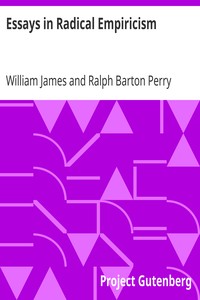Essays in Radical Empiricism by William James
"Essays in Radical Empiricism" by William James is a philosophical treatise written in the early 20th century. This work presents a series of essays that delve into the concept of radical empiricism, which emphasizes the importance of experience and the relationships between experiences while rejecting dualisms like that of consciousness and existence. It aims to articulate a coherent doctrine that challenges existing philosophical paradigms. The opening of the treatise sets the stage
for its exploration of consciousness and experience. James begins by questioning the notion of consciousness as a separate entity, arguing instead that it represents a function within the context of experiences. Rather than viewing consciousness and its objects as distinct, he proposes that both are part of a single continuum of experience, proposing that knowing and being known are interconnected processes. By introducing the concept of "pure experience," James redefines how we understand the relationship between thought and reality, laying the groundwork for the essays that follow in the volume. (This is an automatically generated summary.)
Read or download for free
| How to read | Url | Size | |||
|---|---|---|---|---|---|
| Read now! | https://www.gutenberg.org/ebooks/32547.html.images | 446 kB | |||
| EPUB3 (E-readers incl. Send-to-Kindle) | https://www.gutenberg.org/ebooks/32547.epub3.images | 250 kB | |||
| EPUB (older E-readers) | https://www.gutenberg.org/ebooks/32547.epub.images | 251 kB | |||
| EPUB (no images, older E-readers) | https://www.gutenberg.org/ebooks/32547.epub.noimages | 228 kB | |||
| Kindle | https://www.gutenberg.org/ebooks/32547.kf8.images | 489 kB | |||
| older Kindles | https://www.gutenberg.org/ebooks/32547.kindle.images | 444 kB | |||
| Plain Text UTF-8 | https://www.gutenberg.org/ebooks/32547.txt.utf-8 | 349 kB | |||
| Download HTML (zip) | https://www.gutenberg.org/cache/epub/32547/pg32547-h.zip | 236 kB | |||
| There may be more files related to this item. | |||||
Similar Books
About this eBook
| Author | James, William, 1842-1910 |
|---|---|
| Editor | Perry, Ralph Barton, 1876-1957 |
| LoC No. | 12016286 |
| Title | Essays in Radical Empiricism |
| Note | Wikipedia page about this book: https://en.wikipedia.org/wiki/Essays_in_Radical_Empiricism |
| Contents | Does 'consciousness' exist? -- A world of pure experience -- The thing and its relations -- How two minds can know one thing -- The place of affectional facts in a world of pure experience -- The experience of activity -- The essence of humanism -- La notion de conscience -- Is radical empiricism solipsistic? -- Mr. Pitkin's refutation of 'radical empiricism' -- Humanism and truth once more -- Absolutism and empiricism. |
| Credits | E-text prepared by Brian Foley, Christine D., and the Project Gutenberg Online Distributed Proofreading Team |
| Reading Level | Reading ease score: 57.9 (10th to 12th grade). Somewhat difficult to read. |
| Language | English |
| LoC Class | B: Philosophy, Psychology, Religion |
| Subject | Pragmatism |
| Subject | Experience |
| Category | Text |
| EBook-No. | 32547 |
| Release Date | May 26, 2010 |
| Copyright Status | Public domain in the USA. |
| Downloads | 479 downloads in the last 30 days. |
| Project Gutenberg eBooks are always free! | |

